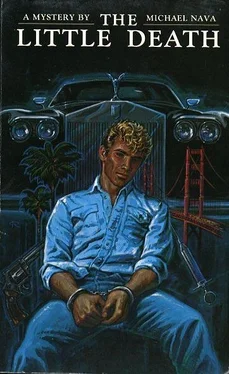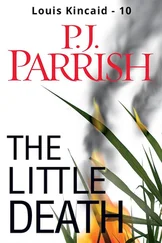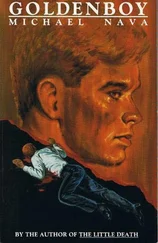Michael Nava - The Little Death
Здесь есть возможность читать онлайн «Michael Nava - The Little Death» весь текст электронной книги совершенно бесплатно (целиком полную версию без сокращений). В некоторых случаях можно слушать аудио, скачать через торрент в формате fb2 и присутствует краткое содержание. Жанр: Криминальный детектив, на английском языке. Описание произведения, (предисловие) а так же отзывы посетителей доступны на портале библиотеки ЛибКат.
- Название:The Little Death
- Автор:
- Жанр:
- Год:неизвестен
- ISBN:нет данных
- Рейтинг книги:5 / 5. Голосов: 1
-
Избранное:Добавить в избранное
- Отзывы:
-
Ваша оценка:
- 100
- 1
- 2
- 3
- 4
- 5
The Little Death: краткое содержание, описание и аннотация
Предлагаем к чтению аннотацию, описание, краткое содержание или предисловие (зависит от того, что написал сам автор книги «The Little Death»). Если вы не нашли необходимую информацию о книге — напишите в комментариях, мы постараемся отыскать её.
The Little Death — читать онлайн бесплатно полную книгу (весь текст) целиком
Ниже представлен текст книги, разбитый по страницам. Система сохранения места последней прочитанной страницы, позволяет с удобством читать онлайн бесплатно книгу «The Little Death», без необходимости каждый раз заново искать на чём Вы остановились. Поставьте закладку, и сможете в любой момент перейти на страницу, на которой закончили чтение.
Интервал:
Закладка:
Visibly startled by my vehemence, she sat back in her chair.
“It won’t bring Hugh back to life,” she said softly.
“Mrs. Paris, do you have any doubt that Hugh was murdered?”
“No,” she said, without hesitation.
“And do you have any doubt that Robert Paris was his murderer?”
In a softer voice she said, “No.”
“But the police say Hugh killed himself, shot himself full of heroin and drowned in three feet of water. You saw the body.”
Her face went white. Her cigarette burned unheeded. She nodded.
“How can you allow your son to be slandered with this ridiculous explanation of his death? It’s as if you left his body to the vultures. Doesn’t he deserve a decent burial, a peaceful rest?”
“Spare me,” she whispered.
“I can’t,” I said. “I loved him.”
She lit another cigarette and proceeded to smoke it, all the while looking out the window as dusk gathered in the sky. Once she lifted a long finger to the ivory cameo at the neck of her blouse. Perhaps her husband had given it to her, perhaps, even, it had been given to her by Hugh. At length she turned her face back to me and studied me for a long time. I did not avoid her eyes but looked back into them.
“You loved him,” she said, at last, echoing me. “I told you once I didn’t understand that kind of love.”
“That love differs only in expression but not quality from the love you felt for him.”
“No,” she said. “The quality is different. Yours — it’s much finer.”
“May I proceed with the suit?”
She said, “All right.”
The words fell like two smooth pebbles and clattered on the desk between us.
“Thank you, Mrs. Paris.” “But I intend to catch that flight for Boston tonight. You’ll be on your own.”
“I understand that.”
“Yes, I imagine you do,” she said. “You strike me as someone who was born to be on his own. I know I was.” These last words were spoken with sadness, resignation. Recovering herself, she said, “I suppose you want me to sign something.”
“No,” I said. “You’ll either be good at your word or you won’t. If not, a piece of paper won’t compel you.”
“You needn’t worry about my word. I never give it unless I intend to honor it.”
I nodded, slightly, in acknowledgment.
“However,” she continued, “I wish to add one condition of your employment by me. You may take your thirty percent if and when we win. In the meantime-” she dug into her bag and withdrew a leather checkbook, “you’ll need money to proceed.”
I watched her write out a check for ten thousand dollars and lay it on the desk between us.
“I’ll expect an accounting, of course,” she said. “If you need more money notify me at the address on the check. But do remember, Mr. Rios, while I may be well-off I’m counting on you to make me truly rich, so spend wisely.”
“I will.”
She rose and gathered up her things. “Now tell me, Mr. Rios, truthfully, if we do get to trial what are our chances of winning?”
“Let me give you a legal answer,” I said. “I would say we have two chances, fat and slim.”
She let out a low, throaty laugh that echoed in the room even after she’d left.
The next morning I stepped up to the counter of the clerk of the superior court, wrote out a check, handed it over with a stack of papers to a young black woman, and with those actions commenced the suit of Paris versus Paris. Along with the complaint and summons, I filed a request for discovery and a restraining order against the disbursement of Robert Paris’s estate pending the outcome of this action. Simultaneously, a courier service I’d hired with some of Mrs. Paris’s money served copies of the documents upon Grayson, Graves and Miller as executors of the judge’s estate. The clerk stamped my copies of the papers and handed them back to me, wishing me a good day as she did. I thanked her and stepped out into the hall and into the glare of television cameras.
“Sir, look this way, please,” a voice called to me. I turned to the camera. A blond man in a gray suit spoke into a microphone, explaining that I had just filed a two hundred and fifty million dollar lawsuit against the estate of Robert Paris claiming that Paris had murdered his grandson. He spoke with no particular urgency and in a normal tone of voice, but to me it was as if he was shouting his words to the world through an amplifier on the tip of the Transamerica pyramid.
At length the blond, introducing himself as Greg Miller, turned to me and said, “Mr. Rios, why have you filed this lawsuit rather than going to the police?”
I cleared my throat and told my story.
When I woke the next morning the phone was already ringing. I let my answering machine take the message as I got out of bed and wandered into the kitchen to start the coffee. I caught the tail end of the message — a reporter from the L.A. Times requesting an interview.
I’d gotten to bed at three that morning, having spent the previous twelve hours talking to reporters from newspapers and television stations from Sacramento to Bakersfield. I put on a bathrobe and stepped outside to pick up the Chronicle and the local. I’d made the front page of both. I glanced at the stories — they were the usual jumble of fact and fantasy but the slant was decidedly in my favor.
I skimmed the rest of the Chronicle. On the next-to-the-last-page, in the society section, I saw a picture of John Smith. He’d attended a charitable function the night before and was shown arriving at the Fairmont. By his expression I saw that he was used to having his picture taken but not particularly tolerant of the practice. He looked away from the camera, both his eyes and his mind visibly occupied on another matter. I had a good idea of what it was.
I folded the paper across Smith’s face and went to the window. Outside the sky was clouded over. Knots of red and yellow leaves waved back and forth in the trees like pennants. There was a lot to be done that day. Grant was expecting me for lunch where we would map out our litigation strategy. The phone messages would have to be responded to. I needed to hire a secretary and have a phone installed in my office. Abruptly, I had become a practicing lawyer. It felt good.
I rinsed out my coffee cup and went to the bedroom where I changed into my sweats and running shoes. I stretched in the living room for a couple of minutes and then went out. It was about seven and there weren’t many other people on the road. A Chinese boy came flying by, long, skinny legs pounding the sidewalk, black hair flapping like silk at the back of his head. We nodded acknowledgment as we passed each other.
It had been some time since I’d last run and it took longer than usual to catch my stride. I swiveled my head back and forth, trying to relax my neck. It was then that I noticed the silver Rolls.
It was gliding a few feet behind me, too slowly and with too little sense of direction. I increased my speed and turned a comer. I looked over my shoulder, and it was still following. Suddenly, the car sped up, turned the corner ahead of me and stopped in my path. I slowed to a trot. The front passenger window was soundlessly lowered. I felt a surge of prickly heat across my chest as my blood rushed not from exertion but from fear. I stopped. The only person in the car was the driver. He was a middle-aged man with silver hair, wearing a black suit, white shirt, black tie and a visored black cap. He turned his face to me and smiled.
“Mr. Rios?” he called out. “I’m sorry if I startled you.”
Cautiously, I approached the car close enough to talk without shouting.
“How do you know who I am?”
“Your picture’s in the papers,” he said. “Mr. Smith wonders if he could see you.”
Читать дальшеИнтервал:
Закладка:
Похожие книги на «The Little Death»
Представляем Вашему вниманию похожие книги на «The Little Death» списком для выбора. Мы отобрали схожую по названию и смыслу литературу в надежде предоставить читателям больше вариантов отыскать новые, интересные, ещё непрочитанные произведения.
Обсуждение, отзывы о книге «The Little Death» и просто собственные мнения читателей. Оставьте ваши комментарии, напишите, что Вы думаете о произведении, его смысле или главных героях. Укажите что конкретно понравилось, а что нет, и почему Вы так считаете.












